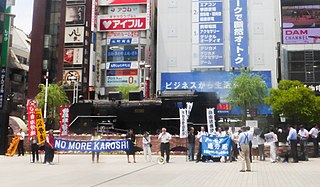Labour laws are those that mediate the relationship between workers, employing entities, trade unions, and the government. Collective labour law relates to the tripartite relationship between employee, employer, and union.

Karoshi, which can be translated into "overwork death", is a Japanese term relating to occupation-related sudden death.
Overtime is the amount of time someone works beyond normal working hours. The term is also used for the pay received for this time. Normal hours may be determined in several ways:

Working (laboring) time is the period of time that a person spends at paid labor. Unpaid labor such as personal housework or caring for children or pets is not considered part of the working week.

A salary is a form of periodic payment from an employer to an employee, which may be specified in an employment contract. It is contrasted with piece wages, where each job, hour or other unit is paid separately, rather than on a periodic basis. From the point of view of running a business, salary can also be viewed as the cost of acquiring and retaining human resources for running operations, and is then termed personnel expense or salary expense. In accounting, salaries are recorded in payroll accounts.
A full-time job is employment in which workers work a minimum number of hours defined as such by their employer.
The weekdays and weekend are the complementary parts of the week devoted to labour and rest, respectively. The legal weekdays, or workweek, is the part of the seven-day week devoted to working. In most of the world, the workweek is from Monday to Friday and the weekend is Saturday and Sunday. A weekday or workday is any day of the working week. Other institutions often follow this pattern, such as places of education. The constituted weekend has varying definitions, based on determined calendar days, designated period of time, and/or regional definition of the working week. Sometimes the term "weekend" is expanded to include the time after work hours on the last workday of the week.
The Employment Standards Act of British Columbia (Canada), is legislation enacted by the provincial government of British Columbia to protect the rights of working people. Sections within the act outline the employers responsibility to their employees, notably things such as minimum wage, meal breaks, and parental leave. The act also works to protect residents of the province by preventing employment discrimination.
The Australian Fair Pay and Conditions Standard was a set of five minimum statutory entitlements for wages and conditions introduced as part of the Howard Government's WorkChoices amendments to Australian labour law in 2006 and then abolished by the Fair Work Act 2009 in 2010.
Japanese labour law is the system of labour law operating in Japan.
Annual leave is a period of paid time off work granted by employers to employees to be used for whatever the employee wishes. Depending on the employer's policies, differing number of days may be offered, and the employee may be required to give a certain amount of advance notice, may have to coordinate with the employer to be sure that staffing is the employee's absence, and other requirements may have to be met. The vast majority of countries today mandate a minimum amount of paid annual leave by law.
The Labor Code of the Philippines is the legal code governing employment practices and labor relations in the Philippines. It was enacted on Labor day, May 1, 1974 by Late President of the Philippines Ferdinand Marcos in the exercise of his then extant legislative powers.

The Fair Labor Standards Act of 1938 29 U.S.C. § 203 (FLSA) is a United States labor law that creates the right to a minimum wage, and "time-and-a-half" overtime pay when people work over forty hours a week. It also prohibits employment of minors in "oppressive child labor". It applies to employees engaged in interstate commerce or employed by an enterprise engaged in commerce or in the production of goods for commerce, unless the employer can claim an exemption from coverage. The Act was enacted by the 75th Congress and signed into law by President Franklin D. Roosevelt in 1938.
Work–life balance in the United States is having enough time for work and enough time to have a personal life in the United States. Related, though broader, terms include lifestyle balance and life balance.

Wage theft is the failing to pay wages or provide employee benefits owed to an employee by contract or law. It can be conducted by employers in various ways, among them failing to pay overtime; violating minimum-wage laws; the misclassification of employees as independent contractors, illegal deductions in pay; forcing employees to work "off the clock", not paying annual leave or holiday entitlements, or simply not paying an employee at all.
The Holidays Act2003 is an Act of Parliament in New Zealand that regulates public holidays. It was amended by the Holidays Amendment Act 2008 and the Holidays Amendment Act 2010. This page includes those changes.
Turkish labour law provides a number of protections to employees, governed by the Labor Code, Trade Union Law, and the Constitution.
Overwork is the expression used to define the cause of working too hard, too much, or too long. It can be also related to the act of working beyond one's strength or capacity, causing physical and/or mental distress in the process.
Labour law regulates the legal relationship in Bulgaria between individual workers and employees as well as between coalitions and representative bodies.
Israeli labor law provides a number of protections to workers in Israel. They are governed by the Basic Laws, the Hours of Work and Rest Law, as well as various other laws, statutes, and regulations.




